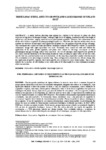Please use this identifier to cite or link to this item:
http://www.alice.cnptia.embrapa.br/alice/handle/doc/1044456| Title: | Trinexapac-ethyl affects growth and gas exchange of upland rice. |
| Authors: | ALVAREZ, R. de C. F.  CRUSCIOL, C. A. C.   NASCENTE, A. S.   RODRIGUES, J. D.   HABERMANN, G.   PAIVA NETO, V. B. de   |
| Affiliation: | RITA DE CASSIA FELIX ALVAREZ, UNIVERSIDADE FEDERAL DE MATO GROSSO DO SUL; CARLOS ALEXANDRE COSTA CRUSCIOL, UNESP, Botucatu-SP; ADRIANO STEPHAN NASCENTE, CNPAF; JOÃO DOMINGOS RODRIGUES, UNESP, Botucatu-SP; GUSTAVO HABERMANN, UNESP, Rio Claro-SP; VESPASIANO BORGES DE PAIVA NETO, UNIVERSIDADE FEDERAL DE MATO GROSSO DO SUL. |
| Date Issued: | 2016 |
| Citation: | Revista Caatinga, Mossoró, v. 29, n. 2, p. 320-326, abr./jun. 2016. |
| Description: | A major problem affecting some upland rice cultivars is the increase in plant size when subjected to high doses of nitrogen fertilizer, leading to high levels of lodging. A method to reduce the height of upland rice, and therefore lodging, would be to use plant growth regulators. However, little information exists on the effect of these regulators on plant physiological processes. Therefore, the objective of this study was to evaluate the influence of trinexapac-ethyl application in upland rice via analysis of growth and gas exchange. The experiment was carried out under greenhouse conditions using the BRS Primavera cultivar. A completely randomized design with eight replications was used. Treatments were carried out with and without the application of the plant growth regulator, and plants were subject to two-stage assessments in which physiological and gas-exchange indices were measured. The use of trinexapac-ethyl improved the growth of rice plants from the flowering to the physiological maturity stage, resulting in higher values of leaf area ratio, specific leaf area, and leaf matter ratio in treated plants. At the same time, it provided smaller reduction in net CO2 assimilation at the physiological maturity stage. Thus, net/apparent assimilation rate did not change after the application of growth regulator, but relative growth rate decreased in these treated plants. These results indicate the occurrence of self-shading in rice plants induced by what might be a supra-optimum trinexapac-ethyl concentration. |
| Thesagro: | Arroz Oryza sativa Regulador de crescimento Fertilizante nitrogenado |
| Keywords: | Processo fisiológico |
| ISSN: | 1983-2125 |
| Type of Material: | Artigo de periódico |
| Access: | openAccess |
| Appears in Collections: | Artigo em periódico indexado (CNPAF)  |
Files in This Item:
| File | Description | Size | Format | |
|---|---|---|---|---|
| CNPAF2016c.pdf | 445,57 kB | Adobe PDF |  View/Open |









